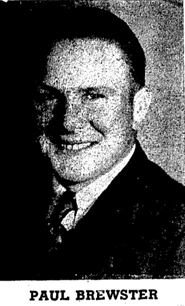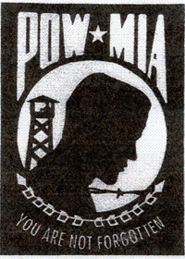Paul Brewster Home After Spending Entire War as Jap Prisoner; Still Smiling
He’s home again and still smiling, in spite of almost 4 years spent in Yawata, a Japanese prison camp! Back to fairly good health again, Paul Brewster, son of Mr. and Mrs. E. E. Brewster, is mighty glad to put that chapter of his life behind him.
Taken prisoner December 23, 1941, while working with the Contractor Pacific Naval Air Base on Wake, he was sent to Shanghai, China, January 12, 1942, with other fellow workers. In September of that year he was removed to Japan until his liberation at the close of the war.
Atrocities.
Paul says the atrocities of the Japanese which have been highly publicized are true, but fortunately for him, he escaped many of them. One beating with a heavy leather strap which was 35 or more lashes on the head and face made him plenty dizzy. The punishment came after a Japanese sergeant had given Paul an extra portion of rice, for having worked hard on a certain project. The worst part of it, in his estimation, was the humiliation—the fact that one had to take it—for to resist would have meant harsher treatment.
At one time he was ill from beri-beri, which pulled his weight down as low as 104 pounds. He was hospitalized by American doctors, also prisoners whose skill brought him out of danger. Much illness and several deaths could have been eliminated, he said, if the American doctors had been given access to the medical and Red Cross supplies which were kept under lock and key. Not until after hostilities ceased were these medicines made available for use on American prisoners.
“I guess the hardest part was that we didn’t get any mail or packages,” he continued. In all the time he was gone only a few letters reached him and never a personal package. They in turn were allowed to write but once every three months, and less than half of the mail reached Laurens.
“We were working the day the war ended, and when they took us back to camp and told us, we just sat down and relaxed. There was plenty of hilarity though when after 10 days food was dropped from the air to us, The boys were really happy,” he said.
“Speedo”
Paul was with a steel company, working alongside the coolies. At first he did carpentering, but later just loaded and hauled steel. “One word the Japanese have learned is speedo, which meant get a move on, but it didn’t have effect on us,” remarked Paul.
“I saw Buck Ackland for the first time Monday, (Oct 29) in Pocahontas. Bob Parks was taken off Wake with me to Shanghai and Buck was left behind with 350 to be taken to Japan later. There were 96 fellows behind then that none of us have ever heard from.” Bob Parks is in California.
In the course of the years in the camp, Paul had one pair of shoes, 4 pairs of socks and the uniforms were cast off Japanese uniforms. They each had one suit for wear on the “day off,” and prisoners were liable to punishment if they wore it to work.
The 3 or 4 small blankets were aired about 3 times a week and were washed once. The straw mattresses were full of bedbugs and many prisoners were fairly eaten up with lice. 144 men slept in the barracks, each one having a space of just 29 inches in width in which to stretch out at night. Some fellows cracked under these conditions.
There were no magazines and the few books were passed from one man to another, each one reading the same book over and over. In Shanghai a radio was available, but there were none after his removal to Japan.
The state of war was never made known to the prisoners, but information which the Koreans imparted to them was usually pretty authentic, Paul said. The rest of it, one couldn’t believe.
When the news of the Pearl Harbor attack was known at Wake, the men thought surely someone would come for the, but they later realized that they didn’t have a chance. Civilians were kept busy moving machine guns and surrounding them with sandbags, day and night, although they had no guns with which to fight themselves.
Paul said if he were to work on such an undertaking again, he wanted to be in a larger place. “I want to know I could at least run and run until I was out of breath, anyway.” On Wake, there was nothing but ocean after two miles.
Source: Laurens Sun, November 1, 1945 (photo included)
![]()


